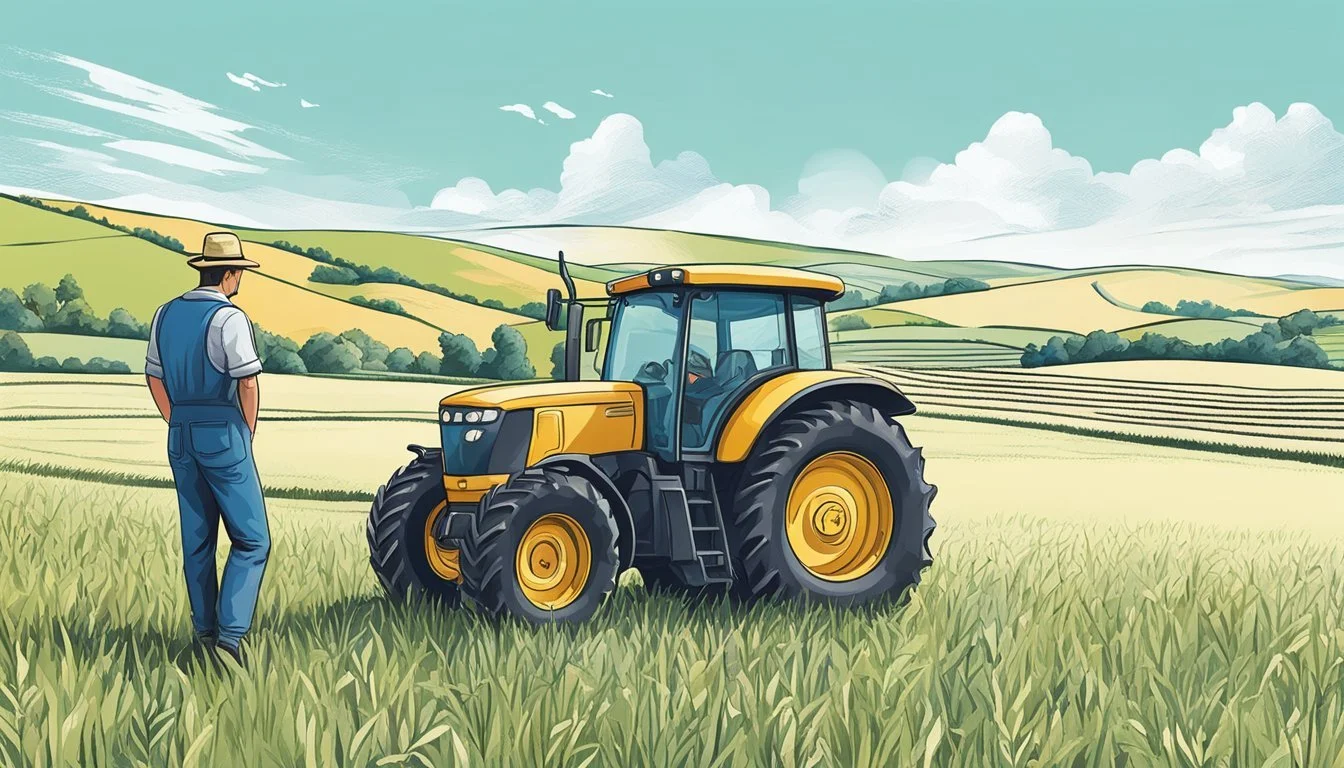Farm Loans in New Hampshire
Navigating Your Financial Options
This Article is Part of Our Guide on Farm Loans for All 50 U.S. States
Agriculture remains a vital component of New Hampshire's economy, with a diverse array of farms dotting the landscape of the Granite State. To support its agriculture, farmers often require financial support for operations ranging from the purchase of land to the procurement of equipment and supplies. Farm loans in New Hampshire address this need, offering monetary assistance tailored to the seasonal and year-round demands of the agricultural sector.
Several financial institutions and programs provide farm loans in New Hampshire, acknowledging the importance of accessible financial services to sustain and grow agricultural businesses. Entities like Farm Plus Financial have a significant presence in the state, offering loans designed to suit the unique needs of the region's farmers. The USDA also plays a crucial role, with the Farm Service Agency (FSA) offering various loans, including Direct Loans, Guaranteed Loans, and others, aimed at both experienced and young farmers in New Hampshire.
Through these agencies and programs, New Hampshire farmers have the support mechanism to manage risks, purchase real estate, and fund operational expenses. This financial backing is central to maintaining the state’s agricultural productivity and assisting farmers in achieving their business objectives. The tailored farm loan options ensure that New Hampshire’s agricultural sector continues to thrive, contributing to the local economy and the state's heritage.
Understanding Farm Loans
Farm loans are financial instruments specifically designed to meet the unique needs of farmers. This section provides a detailed overview of the different types of farm loans, the application process, eligibility requirements, and tools available for assistance.
Types of Farm Loans
Farm loans in New Hampshire, and generally in the United States, come in various forms to cater to different agricultural needs. The main loan products include:
Operating loans: These loans help cover day-to-day expenses, such as buying seeds, livestock feed, and other inputs necessary for farm operations.
Farm ownership loans: A long-term loan option for purchasing farmland.
Guaranteed loans: The USDA partners with local lenders to provide these loans, offering government-backed assurance.
Farm storage facility loans: Used for the construction or upgrade of storage facilities for certain commodities.
Youth loans: These are designed to support young individuals to establish and operate income-producing projects in agriculture-related fields.
Emergency loans: For farmers who have been affected by a natural disaster, emergency loans help rebuild and recover from losses.
These loan options are made available through entities like the USDA's Farm Service Agency (FSA) and private agricultural lenders.
Loan Application Process
The loan application process involves:
Preparation: Gathering all necessary financial records, including proof of income, credit history, and collateral details.
Submission: Filling out the required paperwork, which can be done online at farmers.gov for USDA loans or through a lender's service center.
Review: The lender or FSA will assess the application against various criteria to determine approval.
Clear and accurate documentation is vital in ensuring a smooth approval process.
Eligibility Requirements
Eligibility criteria for farm loans often include:
Credit history: A satisfactory record demonstrating the ability to repay the loan.
Management experience: Proof of competence in managing a farm or similar agricultural enterprise.
Collateral: Adequate security for the loan, such as farm property or equipment.
Operating plan: A plan outlining how the loan will be used and how the farming operation will generate income to repay the loan.
Farmers may also need to meet specific requirements set by the FSA or other lending institutions.
Farm Loan Assistance Tool
The FSA has developed tools to assist farmers in navigating the variety of loan options. One of these tools is the Farm Loan Assistance Tool available at farmers.gov. This online platform simplifies the process of finding information on loans, applicant eligibility, and helps farmers in:
Identifying the right loan to meet their specific needs.
Guiding them through the application process.
Connecting them with a local FSA office or approved lender for further assistance.
By utilizing this tool, farmers can minimize their financial risk and better secure the financing needed for their agricultural business.
Financial Resources for Farmers
The state of New Hampshire provides a range of financial options for its farmers that include federal loan programs, grant opportunities, and resources for effective loan management. These resources aim to support the financial stability and growth of agricultural operations.
Loan Programs and Services
The USDA Farm Service Agency (FSA) offers various loan products to New Hampshire farmers, including Farm Storage Facility Loans (FSFL) and programs like Agricultural Risk Coverage (ARC) & Price Loss Coverage (PLC). Farmers seeking financing can find options ranging from purchasing land to financing equipment. The Inflation Reduction Act has allocated funds specifically for the USDA to assist distressed borrowers, which can be crucial in offering financial relief.
Operating Loans: to cover costs such as seeds, livestock, and equipment.
Ownership Loans: to assist with the purchase of farmland and construction.
Microloans: for smaller financial needs with a streamlined application process.
Grant Opportunities and Incentives
Grants serve as vital financial incentives for farmers and can provide non-repayable funding for various agricultural necessities.
Federal funding options go beyond traditional loans, offering financial support in the form of grants for improvements and innovations in farming practices.
Public and private organizations offer different incentives to support sustainable farming, new agricultural technologies, and the expansion of existing farm operations.
Farm Loan Management
Understanding the intricacies of farm finances is crucial for managing debt and maintaining the economic health of a farm.
Equity and Refinancing: Farmers are often informed about leveraging their own equity for growth, and refinancing can potentially lower interest rates and reduce monthly payments.
Closing Costs and Risk Management: Navigating the complexities of loan closing costs is essential. Comprehensive risk management strategies can protect against financial unpredictability.
Farmers in New Hampshire benefit from a supportive network of financial resources aimed at maintaining the vitality of the state's agricultural industry.
Agricultural Operations in New Hampshire
New Hampshire's farming sector is characterized by its diverse agricultural practices and robust support services for farmers seeking financing options for land and equipment, reflecting a healthy environment for agricultural development.
Overview of Farming in New Hampshire
Agriculture in New Hampshire is shaped by over 4,150 farms that contribute to both the local economy and community sustenance. The state’s farming operations are diverse, with dairy farms representing a significant portion of the agricultural landscape alongside various agribusiness ventures. These farms range from small-scale family operations to larger commercial entities, demonstrating the versatility of New Hampshire’s agricultural capabilities.
Land and Equipment Financing
Financing plays a critical role in the growth and sustainability of farming in New Hampshire. Access to land loans and financing for equipment is crucial for both new and established farmers. Financial institutions and programs, like Farm Plus Financial and the USDA Farm Service Agency, offer tailored solutions that include farm loans and farm equity lines of credit, aiming to support the constant need for capital investment and the modernization of agricultural practices.
Agricultural Development in Washington
Although Washington is geographically distant from New Hampshire, developments and federal agricultural policies there often impact local farmers. The USDA, headquartered in Washington D.C., has programs such as the Inflation Reduction Act, which can assist distressed borrowers with certain FSA direct and guaranteed loans. This shows the interconnected nature of agricultural policy and its implications for local farmers in New Hampshire, where agricultural operations must stay informed of national legislation and opportunities for financial assistance.
Getting Started with Farm Loans
For aspiring farmers and ranchers in New Hampshire, securing a farm loan is a critical step towards financing their agricultural operations. This section will provide guidance on preparing for a loan application and navigating the complex loan process.
Preparing for a Loan Application
Before applying for a farm loan, individuals must gather all necessary documentation and understand the eligibility criteria. Prospective borrowers should:
Evaluate Credit History: A thorough review of credit history is essential, as it will affect loan eligibility and interest rates.
Assess Financing Needs: Clearly define the financial requirements for the farming operation, including the purpose of the loan.
Understand Loan Products: Familiarize themselves with various loan products offered by institutions like the USDA and Farm Plus Financial.
Gather Required Documents: Prepare key documents such as proof of farm experience, a business plan, and financial statements.
Navigating the Loan Process
Once the initial preparations are complete, applicants can proceed with the loan process. They should:
Submit the Application: Complete the application form with all required details, ensuring accuracy to avoid delays.
Respond to Queries: Be ready to answer any questions from the lender regarding the application to clarify any uncertainties.
Await Approval: The approval process may take time as lenders assess risk and verify information.
Understand Closing Procedures: Once the loan is approved, borrowers need to understand the closing process, including any additional documentation and final agreements.
By being meticulous with their loan applications and understanding the related procedures, new farmers and ranchers can increase their chances of securing the necessary funds to support their farming ventures in New Hampshire.





